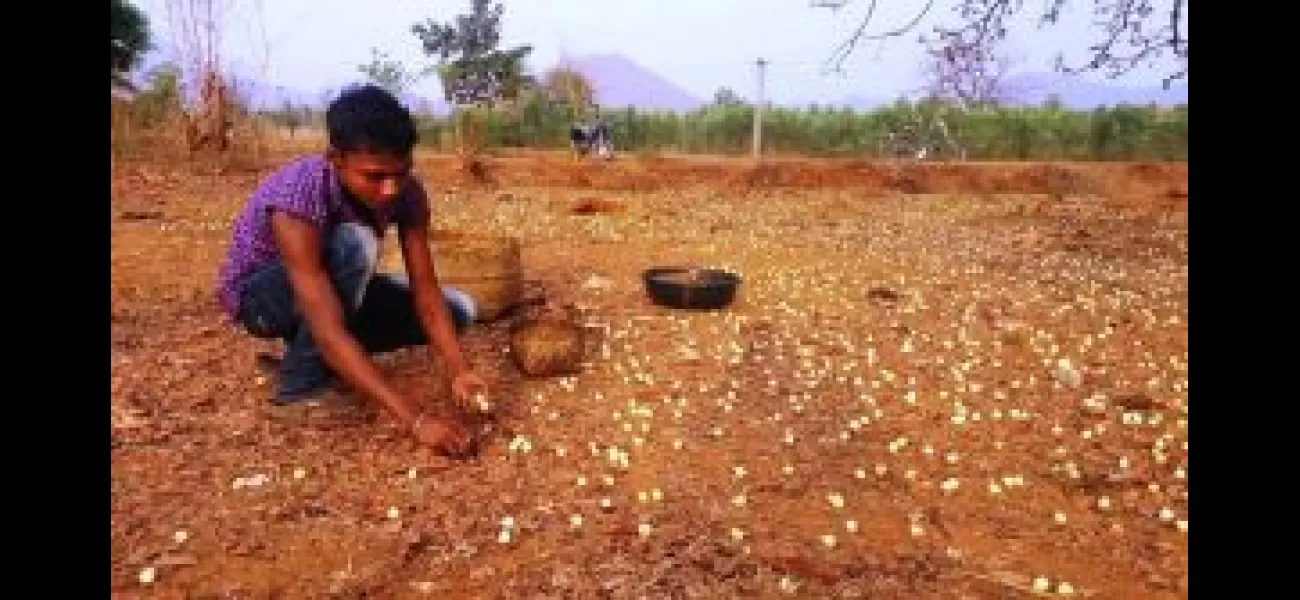Tribal community suffers from urgent Mahua sale
Rayagada district is known for its abundance of Mahua flowers, a minor forest produce. However, the lack of government control on procurement is exploiting the tribals.
May 25th 2024.

Rayagada, a district in India, is known for its large population of tribal communities. One of the main reasons for this special identity is the abundance of Mahua flowers, a minor forest produce that is found in the district. However, despite the availability of this valuable resource, the tribals are facing challenges due to a lack of government control over its procurement. Many of them are being taken advantage of by middlemen who offer them low prices for their Mahua flower stocks. This is mainly because there are no formal marketing facilities, minimum support price (MSP) regulations, or proper storage facilities in place.
To address this issue, the government has set a minimum support price of `29 per kg for Mahua flowers and has identified seven districts, including Rayagada, for collection and procurement. However, one major problem is that the state-owned Tribal Development Cooperative Corporation (TDCC) has not yet enlisted Mahua flowers as one of its minor forest produce (MFP) items. This has resulted in distress sales of the forest produce by the gullible tribals. It is believed that traders are using middlemen to procure the Mahua stocks directly from the tribals at very low prices. This year, the Mahua flowers have bloomed in abundance in all the tribal-dominated districts of Odisha, giving the tribals hope for a bumper harvest. However, the fear of another round of distress sales now haunts them.
As the tribals in the district's villages start collecting the Mahua flowers, they are facing pressure from traders and middlemen to reduce the price to as low as Rs 30-35 per kg. This has caused great concern among the tribals, who heavily rely on the earnings from Mahua collection for their livelihood. According to a survey by the state's Scheduled Caste and Scheduled Tribes department, Mahua flowers are produced in around 10 districts of the state, with Rayagada being one of them. Other districts include Kandhamal, Keonjhar, Sundargarh, Koraput, Nabarangpur, Mayurbhanj, Deogarh, and Sambalpur.
The earnings of the tribals from Mahua collection vary greatly across districts, with Bolangir district having the highest at 95.45%, and Nuapada district having the lowest at only 60.23%. For many tribals and members of the Dalit community, Mahua collection is the main source of income from minor forest produce. On average, tribal collectors earn around Rs 20 per kg from the sale of Mahua flowers, which are then used to make food products that are sold for much higher prices. Mahua is also a key ingredient in the production of liquor and has recently been added to the food security list.
To promote the market for Mahua-based products at a national level, the state government has launched efforts to make various food items such as jam, jelly, cookies, halwa, gulab jamun, cake, and chocolates using Mahua flowers. They are also exploring the use of Mahua in making hand sanitizers and floor cleaning liquids. When contacted, the executive officer of Rayagada Zilla Parishad, Nihar Ranjan Kanhar, stated that the state government has directed the Local Area Multi-Purpose Cooperative Societies to oversee the collection and set the price of Mahua flowers. He also mentioned that an investigation will be conducted into the allegations of distress sales and appropriate action will be taken.
To address this issue, the government has set a minimum support price of `29 per kg for Mahua flowers and has identified seven districts, including Rayagada, for collection and procurement. However, one major problem is that the state-owned Tribal Development Cooperative Corporation (TDCC) has not yet enlisted Mahua flowers as one of its minor forest produce (MFP) items. This has resulted in distress sales of the forest produce by the gullible tribals. It is believed that traders are using middlemen to procure the Mahua stocks directly from the tribals at very low prices. This year, the Mahua flowers have bloomed in abundance in all the tribal-dominated districts of Odisha, giving the tribals hope for a bumper harvest. However, the fear of another round of distress sales now haunts them.
As the tribals in the district's villages start collecting the Mahua flowers, they are facing pressure from traders and middlemen to reduce the price to as low as Rs 30-35 per kg. This has caused great concern among the tribals, who heavily rely on the earnings from Mahua collection for their livelihood. According to a survey by the state's Scheduled Caste and Scheduled Tribes department, Mahua flowers are produced in around 10 districts of the state, with Rayagada being one of them. Other districts include Kandhamal, Keonjhar, Sundargarh, Koraput, Nabarangpur, Mayurbhanj, Deogarh, and Sambalpur.
The earnings of the tribals from Mahua collection vary greatly across districts, with Bolangir district having the highest at 95.45%, and Nuapada district having the lowest at only 60.23%. For many tribals and members of the Dalit community, Mahua collection is the main source of income from minor forest produce. On average, tribal collectors earn around Rs 20 per kg from the sale of Mahua flowers, which are then used to make food products that are sold for much higher prices. Mahua is also a key ingredient in the production of liquor and has recently been added to the food security list.
To promote the market for Mahua-based products at a national level, the state government has launched efforts to make various food items such as jam, jelly, cookies, halwa, gulab jamun, cake, and chocolates using Mahua flowers. They are also exploring the use of Mahua in making hand sanitizers and floor cleaning liquids. When contacted, the executive officer of Rayagada Zilla Parishad, Nihar Ranjan Kanhar, stated that the state government has directed the Local Area Multi-Purpose Cooperative Societies to oversee the collection and set the price of Mahua flowers. He also mentioned that an investigation will be conducted into the allegations of distress sales and appropriate action will be taken.
[This article has been trending online recently and has been generated with AI. Your feed is customized.]
[Generative AI is experimental.]
0
0
Submit Comment





